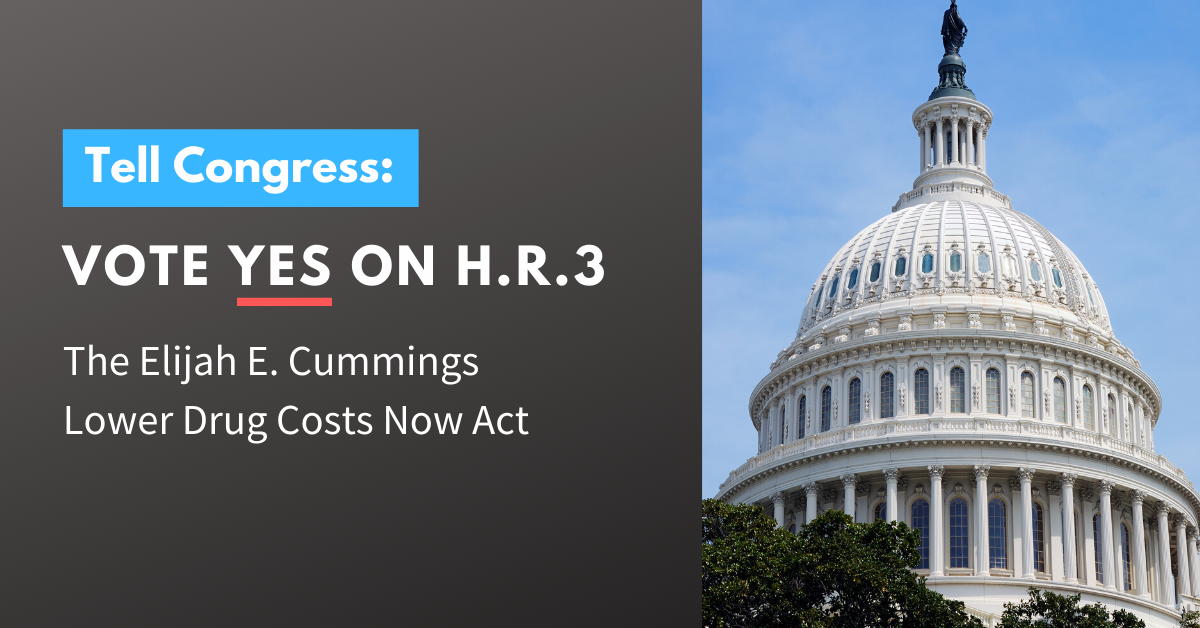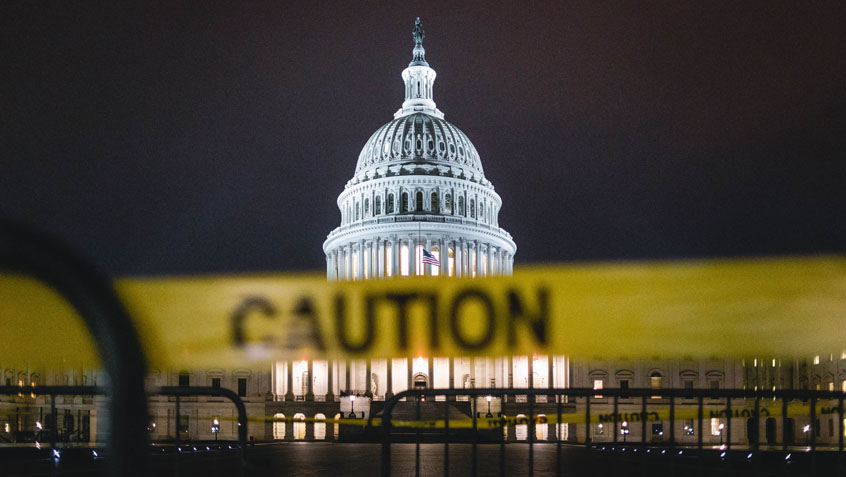
Court Declares Part of Affordable Care Act Unconstitutional, Risk of Lost Coverage for Millions
One year ago, in a deeply flawed ruling, a Texas judge found the portion of the Affordable Care Act (ACA)
Medicare Watch articles are featured in a weekly newsletter that helps readers stay up-to-date on Medicare policy and advocacy developments, and learn about changes in Medicare benefits and rules.

One year ago, in a deeply flawed ruling, a Texas judge found the portion of the Affordable Care Act (ACA)

This week, the U.S. House of Representatives is expected to consider the Elijah E. Cummings Lower Drug Costs Now Act (H.R. 3). This landmark bill takes significant steps to rein in high and rising prescription drug prices and lower costs for people with Medicare, including authorizing Medicare to negotiate prices for certain drugs and capping beneficiary out-of-pocket drug spending at $2,000 per year.

This week, a bipartisan group of leaders from the U.S. House of Representatives Committees on Energy & Commerce and Ways & Means sent a letter to the Centers for Medicare & Medicaid Services (CMS) expressing concerns with the redesigned Medicare Plan Finder (MPF). The letter points to errors that advocates and Medicare counselors experienced when using the new tool to help beneficiaries compare and select Medicare Advantage and Part D prescription drug plans during Fall Open Enrollment. In the letter, the leaders urge CMS to ensure that people with Medicare who relied on MPF information to choose a plan this year are held harmless and have the opportunity to make changes to their coverage in 2020.

The Medicare Rights Center applauds the passage of the Elijah E. Cummings Lower Drug Costs Now Act (H.R. 3) by the U.S. House of Representatives. This landmark bill would significantly improve health care and prescription drug affordability for people with Medicare.

This week, the Medicare Rights Center provided comment to the Food and Nutrition Service (FNS) in response to a proposed rule that would dramatically affect access to benefits by cutting billions of dollars of funding from the Supplemental Nutrition Assistance Program (SNAP), also referred to as food stamps.

A new data note from the non-profit Kaiser Family Foundation (KFF), however, reveals that very few people with Medicare end up switching plans during the fall. Among MA and PDP plan enrollees who did not receive low-income subsidies, fewer than 8% of people enrolled in MA plans chose to switch to another MA plan in 2016. The pattern is similar for standalone drug plans–just over 8% switched from one PDP to another. This could mean that beneficiaries have reviewed and are happy with their coverage, but it might highlight a more troubling reality– people may not know they can switch plans or may find the process of comparing plan options too burdensome.

A recent poll and study by Gallup and West Health found that most Americans are worried about rising health care costs, and many are also concerned about bankruptcy from major health events. Older adults have somewhat more confidence about their access to quality care than younger people, but they still experience difficulty with affordability, especially when it comes to paying for prescription drugs. These findings and more are an important indicator that more must be done to bring down health care costs.

Medicare’s Fall Open Enrollment Period (OEP) is a busy time for beneficiaries and those who help them evaluate their health care and prescription drug coverage options. From October 15 to December 7 each year, people with Medicare can make changes to their coverage, such as switching Part D prescription drug plans, or switching between Original Medicare and Medicare Advantage. This annual decision-making process can be complex, and several changes this year are making it even more so.

The Centers for Medicare & Medicaid Services (CMS) recently finalized a rule that expands Medicare coverage for Opioid Use Disorder (OUD). Recent legislation, the Substance Use Disorder Prevention that Promotes Opioid Recovery and Treatment for Patients and Communities (SUPPORT) Act, established a pathway for this more comprehensive Medicare coverage of OUD services. Beginning on January 1, 2020, Medicare Part B will cover OUD treatment—including methadone for Medication Assisted Therapy (MAT)—furnished by an Opioid Treatment Program (OTP) under a bundled payment mechanism. This means a significant improvement in access to OUD care for people with Medicare, including for those who are dually eligible for Medicaid.

Last week, the Centers for Medicare & Medicaid Services (CMS) announced
the Medicare Part B premium for 2020. Starting January 1, the standard Part B premium will increase from $135.50 to $144.60 per month.

One year ago, in a deeply flawed ruling, a Texas judge found the portion of the Affordable Care Act (ACA)

This week, the U.S. House of Representatives is expected to consider the Elijah E. Cummings Lower Drug Costs Now Act (H.R. 3). This landmark bill takes significant steps to rein in high and rising prescription drug prices and lower costs for people with Medicare, including authorizing Medicare to negotiate prices for certain drugs and capping beneficiary out-of-pocket drug spending at $2,000 per year.

This week, a bipartisan group of leaders from the U.S. House of Representatives Committees on Energy & Commerce and Ways & Means sent a letter to the Centers for Medicare & Medicaid Services (CMS) expressing concerns with the redesigned Medicare Plan Finder (MPF). The letter points to errors that advocates and Medicare counselors experienced when using the new tool to help beneficiaries compare and select Medicare Advantage and Part D prescription drug plans during Fall Open Enrollment. In the letter, the leaders urge CMS to ensure that people with Medicare who relied on MPF information to choose a plan this year are held harmless and have the opportunity to make changes to their coverage in 2020.

The Medicare Rights Center applauds the passage of the Elijah E. Cummings Lower Drug Costs Now Act (H.R. 3) by the U.S. House of Representatives. This landmark bill would significantly improve health care and prescription drug affordability for people with Medicare.

This week, the Medicare Rights Center provided comment to the Food and Nutrition Service (FNS) in response to a proposed rule that would dramatically affect access to benefits by cutting billions of dollars of funding from the Supplemental Nutrition Assistance Program (SNAP), also referred to as food stamps.

A new data note from the non-profit Kaiser Family Foundation (KFF), however, reveals that very few people with Medicare end up switching plans during the fall. Among MA and PDP plan enrollees who did not receive low-income subsidies, fewer than 8% of people enrolled in MA plans chose to switch to another MA plan in 2016. The pattern is similar for standalone drug plans–just over 8% switched from one PDP to another. This could mean that beneficiaries have reviewed and are happy with their coverage, but it might highlight a more troubling reality– people may not know they can switch plans or may find the process of comparing plan options too burdensome.

A recent poll and study by Gallup and West Health found that most Americans are worried about rising health care costs, and many are also concerned about bankruptcy from major health events. Older adults have somewhat more confidence about their access to quality care than younger people, but they still experience difficulty with affordability, especially when it comes to paying for prescription drugs. These findings and more are an important indicator that more must be done to bring down health care costs.

Medicare’s Fall Open Enrollment Period (OEP) is a busy time for beneficiaries and those who help them evaluate their health care and prescription drug coverage options. From October 15 to December 7 each year, people with Medicare can make changes to their coverage, such as switching Part D prescription drug plans, or switching between Original Medicare and Medicare Advantage. This annual decision-making process can be complex, and several changes this year are making it even more so.

The Centers for Medicare & Medicaid Services (CMS) recently finalized a rule that expands Medicare coverage for Opioid Use Disorder (OUD). Recent legislation, the Substance Use Disorder Prevention that Promotes Opioid Recovery and Treatment for Patients and Communities (SUPPORT) Act, established a pathway for this more comprehensive Medicare coverage of OUD services. Beginning on January 1, 2020, Medicare Part B will cover OUD treatment—including methadone for Medication Assisted Therapy (MAT)—furnished by an Opioid Treatment Program (OTP) under a bundled payment mechanism. This means a significant improvement in access to OUD care for people with Medicare, including for those who are dually eligible for Medicaid.

Last week, the Centers for Medicare & Medicaid Services (CMS) announced
the Medicare Part B premium for 2020. Starting January 1, the standard Part B premium will increase from $135.50 to $144.60 per month.
CELEBRATING

Help us honor 35 years of making Medicare more affordable, accessible, and equitable. Sign up to receive special alerts with ways to support our 35 years of service to older adults and people with disabilities. Learn more at www.medicarerights.org/35.